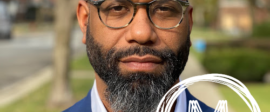A Daily Examen for Living as an Antiracist Person
Devotional / External content not produced by TOW Project
The examen is an ancient prayer practice that encourages reflection on the events of each day in order to detect God's presence and discern his direction for us.[1] The examen helps us connect with God as we reflect on any or every part of our day, including times of work. The examen below, written by Vernée Wilkinson and Ted Wueste, is adapted for those who wish to seek God's transformation and guidance toward anti-racism.
A Daily Examen for Living as an Antiracist Person
For many of us, we are realizing that the statement “I’m not a racist” is not enough. Better is to say “I’m antiracist.” In other words: proactively standing against racism in our hearts and minds, in our interactions with others, and in the way we strive to see our cultural institutions operate. In that spirit, we offer this examen. An examen is a structured prayer in which we are led to prayerfully reflect on our lives by focusing on being present to God and asking God to search our hearts and guide our steps. *set aside time daily to slowly pray through these questions
1. Remind yourself that you are in God's presence. Give thanks for God's grace in your life. Give thanks for God’s love for all who have been made in His image.
2. Pray for the grace to understand how God is at work in you as it relates to living as an antiracist person. Review, with God, the call to be active in bringing peace and justice to the world around you.
As you consider the injustice of racism, what does the Spirit seem to be stirring in your spirit? Do I extend the peace of Christ to people of color with my words, deeds, actions and influence? How have I allowed the evil of racism to affect me? Have I “wept with those who weep?"
3. Review your day ... Ask God to search your heart and mind to see how embedded thought patterns of bias might have affected you today.
Have I done anything to diminish the image of God in my neighbor, friend, colleague or family members that are persons of color? Did I say hurtful words to someone or about someone because of their race? Have I been silent when I could have spoken peace and truth into a racially biased or explicitly racist situation?
4. Reflect on what you did, said, or thought in those instances. Were you drawing closer to God’s heart concerning racial injustice, or further away?
Are my private thoughts uplifting and loving towards all races? Do I recognize people of color as fearfully and wonderfully made? Where do I struggle with this the most? a specific person, people group or environment? Where can I let go of my ego and make more space for racial justice?
Are there ways in which I promoted peace and extended love to people of color?
Take a few moments to repent and ask for forgiveness where it is needed, and then celebrate with God where you see growth and transformation.
5. Look toward tomorrow — think of how you might collaborate more effectively with God's heart to extend brotherly and sisterly love.
How can I speak up, show up and affirm people of color in my life? in society? What action can I take tomorrow to nourish the longing for racial justice?
Are there things that need to be undone? Is there someone to whom I need to apologize? Is there someone to whom I need to reach out?
How can I be antiracist in my community of influence as well as help in the work of larger societal change? What ongoing values and actions will I apply towards living a life as an antiracist person?








